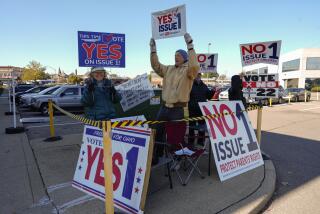Surgeons in W.Va. Strike Over Costs of Malpractice
- Share via
WASHINGTON — Reflecting a growing concern nationally, surgeons at four West Virginia hospitals went on strike Wednesday to protest rising malpractice insurance premiums. The walkouts forced the cancellation or rescheduling of many elective surgeries in the northern part of the state.
Meanwhile, physicians in Pennsylvania backed off their threat to close their practices New Year’s Day after the state’s governor-elect promised to seek state money to ease their high rates.
The back-to-back showdowns came after a year when Ohio and Nevada became the latest states to cap “pain and suffering” damages in medical malpractice cases in an attempt to stem the problem. Nationally, malpractice premiums have soared by as much as 80% a year in some states, and last year President Bush entered the debate over rising costs, calling for a cap similar to one put in place in California by a law passed in 1975.
However, some detractors question whether the California measure has been effective. While supporters say it has limited premium costs, others say it has restricted legal options in all but the most clear-cut malpractice cases, where patients have a chance of winning large awards.
Liability rates have risen sharply across the country and across medical specialties, according to research cited by the American Medical Assn.
Surgeons experienced a 25% average premium increase from July 2001 to July 2002, the AMA said. Internists saw their average premiums rise by 24.7% and obstetricians-gynecologists by 19.6%. Alabama and Alaska were the only states that saw rate decreases for those physicians.
In northern West Virginia on Wednesday, several dozen surgeons at four hospitals began leaves of absences of a month or more. Emergency rooms remained opened, but the hospitals planned to divert trauma surgeries to facilities elsewhere in the state and in Pennsylvania or Ohio. The walkouts came after a series of meetings this week between individual surgeons and Tom Susman, the director of the state’s Public Employees Insurance Agency.
The West Virginia Legislature is expected to consider medical malpractice reform when it convenes next week and Susman had asked that the protest be postponed, some surgeons said.
Skyrocketing damage awards -- more than half exceeding $1 million in 1999 and 2000, and several of as much as $100 million last year, according to government reports -- have prompted private insurance companies to stop offering malpractice coverage in some regions, including West Virginia. Doctor groups say the premiums also are pricing some doctors out of business, forcing them to retire early, limit their practice to less-litigious patients and move to states that have reformed their malpractice litigation systems.
The West Virginia Legislature has passed a state program in an attempt to fill the gap in malpractice insurance, but the surgeons say this has not stemmed the rate increases.
“We just can’t afford to practice in this environment under these conditions,” said Dr. Gregory M. Saracco, a general surgeon who took a leave from Wheeling Hospital Inc. “We probably have the most expensive malpractice insurance rates and the worst tort system in the country.”
Saracco said his malpractice premiums doubled this year, to $73,000, and will increase in 2004 to as much as $100,000.
He said the physicians had pleaded for help from the state Legislature for the last two to three years. “Nobody would listen,” he said.
At Wheeling Hospital, which performs 17,000 surgeries annually, 18 of 19 general, orthopedic and cardiac surgeons are taking leaves of 30 days, said Dr. Donald H. Hofreuter, the hospital’s chief executive. A single staff orthopedic surgeon will remain on duty. About 35 surgeons practice at the hospital.
At least one patient was transferred because of the walkout -- an emergency general surgery patient who was transported 88 miles to a West Virginia University hospital early Wednesday, Hofreuter said.
At Ohio Valley Medical Center in Wheeling, 13 surgeons took leaves beginning Wednesday, prompting the cancellation of most elective operations, spokesman Howard Gamble said. “This is the vast number of our surgeons.”
Ten surgeons, nearly one-quarter of the Weirton Medical Center’s total, including all its orthopedic surgeons and urologists, requested indefinite leaves, a spokesman said. At Reynolds Memorial Hospital in Glen Dale, eight surgeons took leaves. Some of the surgeons involved in the walkouts are affiliated with more than one of the hospitals.
Dr. Robert Zaleski, an orthopedic surgeon, said the physicians are not calling their actions a strike. “Doctors, on an individual basis, had to make a decision after much soul-searching,” he said. They hope this will lead to legal reform that caps damage awards and prompts private insurance companies to provide affordable rates to the state’s physicians, he said.
In eastern Pennsylvania, 42 physicians -- including neurosurgeons, orthopedists and obstetrician-gynecologists -- had threatened to walk off the job Wednesday. They canceled their plans after Gov.-elect Ed Rendell vowed to push for $220 million to lower doctors’ insurance costs.
Under the proposal, Rendell will cut doctors’ payments to a state insurance fund by two-thirds and have insurers pay into the fund. Rendell, a Democrat, doesn’t take office for three weeks and must persuade the Republican-controlled Legislature to accept his plan. But the physicians said they regarded Rendell’s proposal as an act of good faith.
In July, the only trauma center in Las Vegas closed for 10 days when more than 50 doctors temporarily quit over the malpractice issue. The next month, the Nevada Legislature passed a malpractice reform bill that capped most jury awards at $350,000.
*
Associated Press contributed to this report.
More to Read
Sign up for Essential California
The most important California stories and recommendations in your inbox every morning.
You may occasionally receive promotional content from the Los Angeles Times.













